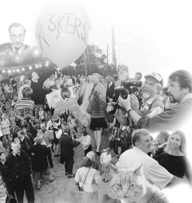Juror
Ivars Seleckis
 [Juror’s Statement]
[Juror’s Statement]
It is especially important to perceive and grasp the thoughts and actions of the “little people” in their daily struggle for survival in this world: trying to raise children, to give them at least an elementary education and to live a decent human life in this day and age.
While powerful instruments of mass-media are creating an oversimplified, commercialized world according to their own rules and without any regard to existing realities, there are still artists and authors who offer the world more or less realistic representations of human society, the images of which are furnished by the documentary filmmaker whose chief duty is to provide honest and truthful information.
Today we are faced with many new questions, questions that particularly affect small countries. What can today’s documentary filmmaker offer contemporary people, floundering in the ocean of globalization, to help them not to fear the sense of their apparent nothingness? What can the documentary filmmaker offer us to protect ourselves from the dangers of losing our connection to our culture, our language, our people and ultimately to ourselves? How can contemporary people be persuaded to take part in a dialogue of cultures and peoples; how can we be prevented from dissolving into a single common primitive mass?
I thus see it as an important opportunity to take part in the Yamagata Festival where one can see a world panorama of documentary cinema—a cinema whose works may respond to new questions or calls arising as society undergoes further stages of development in the future. I wish my colleagues spiritual strength, as well as faith in the ability of documentary works taking a successful part in dialogues with society.
| Ivars Seleckis
Born in 1934 in Riga, Latvia. Graduated from the Academy of Agriculture, the Faculty of Food Technology in Jelgava in 1957 and from the State Institute of Cinematography in 1966. Has been working at Riga film studio since 1958 as an assistant cameraman, newsreel cameraman, director of photography and since 1968 as a film director. Now a film director at production company European Documentary Film Symposiums. Both in Latvia and international festivals his documentaries have been noted for their thorough and sophisticated analysis of the social processes. His works include Encounters in Guines (1968), The Widening of the World (1980), Come Down, Pale Moon! (1994) and others. The Crossroad Street (1988) won the Grand Prize in International Competition at YIDFF ’89. |
New Times at Crossroad Street
Jaunie Laiki Skersiela LATVIA / 1999 / Latvian, Russian / Color / 35mm (1:1.33) / 85 min
LATVIA / 1999 / Latvian, Russian / Color / 35mm (1:1.33) / 85 min
Director, Photography: Ivars Seleckis
Script: Tãlivaldis Margẽvičs
Editing: Maija Selecka
Sound: Aivars Riekstiņš, Nikolaįs Gridņevs
Music: Ivars Vĩgners
Producer: Baiba Urbane
Production Company: EDFS
Source: National Film Centre, Latvia
Elizabetes 49, Riga, LV1010 LATVIA
Phone: 371-7-505079 Fax: 371-7-505077
E-mail: lelda.ozola@nfc.gov.lv
Ten years after The Crossroad Street (1988), the Soviet Union has collapsed. Riga, the town where the street with the Crossroad has now became the capital of the independent Republic of Latvia. Seleckis looks upon the town and the people around the crossroad street, notes what has changed and what has not with a warm gaze, and tells their story as if it were an ancient tale with a voiceover filled with humor, humanity, and pathos.
|
• International Competition | Angelos’ Film | A2 | Buenaventura Durruti, Anarchist | Crazy | Days in Those Mountains | La Devinière | Gaea Girls | Grandma’s Hairpin | In Vanda’s Room | The Land of the Wandering Souls | Mysterious Object at Noon | Paragraph 175 | Private Chronicles. Monologue | 6 Easy Pieces | Southern Comfort • Jurors | Hartmut Bitomsky | Bernard Eisenschitz | Ann Hui | Kuroki Kazuo | Ivars Seleckis |
